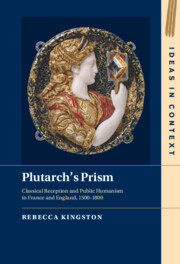Book contents
- Plutarch’s Prism
- Ideas in Context
- Plutarch’s Prism
- Copyright page
- Contents
- Figures
- Preface
- Acknowledgements
- Introduction
- Part I Setting the Stage
- Part II Plutarch in Renaissance France and England
- Chapter 3 Plutarch in Early French Renaissance Public Humanism: Geoffroy Tory and Guillaume Budé
- Chapter 4 Plutarch in Early French Renaissance Public Humanism: Desiderius Erasmus and Claude de Seyssel
- Chapter 5 Tudor Plutarch
- Chapter 6 Plutarch in Later French Humanism and Reformation: Georges de Selve, Jacques Amyot and Jean Bodin
- Chapter 7 Bernard de Girard Du Haillan and Michel de Montaigne on Thinking Through the Public Good in a Time of Civil Discord
- Part III Seventeenth- and Eighteenth-Century Plutarch
- Bibliography
- Index
Chapter 5 - Tudor Plutarch
from Part II - Plutarch in Renaissance France and England
Published online by Cambridge University Press: 22 September 2022
- Plutarch’s Prism
- Ideas in Context
- Plutarch’s Prism
- Copyright page
- Contents
- Figures
- Preface
- Acknowledgements
- Introduction
- Part I Setting the Stage
- Part II Plutarch in Renaissance France and England
- Chapter 3 Plutarch in Early French Renaissance Public Humanism: Geoffroy Tory and Guillaume Budé
- Chapter 4 Plutarch in Early French Renaissance Public Humanism: Desiderius Erasmus and Claude de Seyssel
- Chapter 5 Tudor Plutarch
- Chapter 6 Plutarch in Later French Humanism and Reformation: Georges de Selve, Jacques Amyot and Jean Bodin
- Chapter 7 Bernard de Girard Du Haillan and Michel de Montaigne on Thinking Through the Public Good in a Time of Civil Discord
- Part III Seventeenth- and Eighteenth-Century Plutarch
- Bibliography
- Index
Summary
Chapter 5 explores the distinct dynamics of Plutarch reception in England prior to the famous 1579–1603 translations of Thomas North (1535–1604). In England at this time, Plutarch’s work was read largely through a Ciceronian lens. I reflect on the vernacular translations of Plutarch’s moral essays by Thomas Wyatt (1503–1542), Thomas Elyot (1490–1546), Thomas Blundeville (1522–1606), Richard Taverner and Queen Elizabeth I (1533–1603) as well as explore the place of Plutarch in Thomas More’s Utopia (1516). I argue that prior to the translations of Thomas North, Plutarch was read predominantly in England as a thinker whose political insights were secondary to his moral ones. While the increasing precariousness of the English realm into the latter sixteenth century changed the tone of political thought, the English never read their Plutarch in the vernacular with the same attention to the nature of public office and the public realm in the way prevalent in France earlier in the century.
Keywords
- Type
- Chapter
- Information
- Plutarch's PrismClassical Reception and Public Humanism in France and England, 1500–1800, pp. 195 - 232Publisher: Cambridge University PressPrint publication year: 2022

